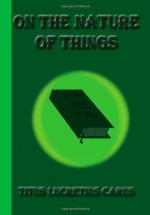|
This section contains 310 words (approx. 1 page at 400 words per page) |

|
On the Nature of Things Summary & Study Guide Description
On the Nature of Things Summary & Study Guide includes comprehensive information and analysis to help you understand the book. This study guide contains the following sections:
This detailed literature summary also contains Bibliography on On the Nature of Things by Lucretius.
Lucretius' scientific epic De rerum natura is considered a masterpiece of Epicurean philosophy. Epicurus taught that the world could be understood by reason and that religion only arouses unnecessary fear. Lucretius denounced popular beliefs in deities and supernatural creatures. He viewed humans as ignorant creatures who fabricated the powers of the gods, only to live in fear of them. In his epic, Lucretius appeals to reason in order to enlighten his readers and persuade them to accept his belief system. Because of its atheistic ideals, De rerum natura almost faded into obscurity as Christianity gained momentum. During the Renaissance, however, Lucretius's epic was rediscovered, and it continues to be translated and studied today.
As a poem, De rerum natura is remarkable. First, it is a lyrical presentation of what would otherwise be tedious information. Second, it is the earliest known work of Latin hexameter verse. (Hexameter verse is poetry in which each line has six "feet," or units of rhythm.) The fact that it is such a lengthy example secures its distinction as an important work. Although a rumor persists that Cicero edited the epic, history better supports the idea that Cicero's brother Quintus directed its publication.
De rerum natura is praised for its depiction of nature as a source of life, death, joy, peace, and terror. It is not a poem strictly about the physical world, as Epicureanism also offers guidelines for human conduct and relationships. Lucretius's philosophy of how human beings should live dictates pursuing friendship and avoiding war. In the introduction to his translation of De rerum natura, Anthony M. Esolen comments that Lucretius "really believes that in Epicureanism lies our best hope for happiness, and he very much wants to let us in on the secret, so that we may be as happy as is possible in a world imperfectly suited for our existence."
Read more from the Study Guide
|
This section contains 310 words (approx. 1 page at 400 words per page) |

|



